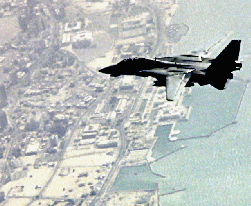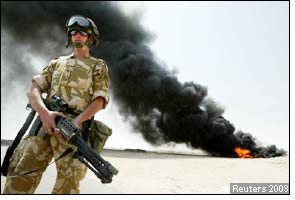Some critics are concerned that the military is close to depleting its voluntary forces and will have no choice but to turn to involuntary conscription. "I'm trying not to be a conspiracy theorist about it, but if you need more people, where are they going to come from?" said Luke Yu, membership outreach coordinator of the Tufts Democrats. The Bush administration has already integrated the National Guard and Individual Ready Reserve (IRR) units into active duty, and has mandated the involuntary extension of soldier's contracts who have already served their previously allotted commitment. "We have forced over 80,000 soldiers to serve beyond what they were contracted to serve," Brandzel said. "Forty percent of the forces in Iraq are National Guard. The military has never been more depleted, ever," he said.
During his campaign, John Kerry charged that these actions constitute a "backdoor draft," a phrase that resonated with critics of the way the war is being conducted. But President of the Tufts Republicans Nicholas Boyd disagreed with Kerry's term. "There is no 'backdoor' draft," he said. "Nobody serving in the United States military today was forced into duty. Every member of the armed forces, whether Reserve, National Guard, or full-time understood the possible nature of their commitment and entered into it freely," he said. "It is wrong to diminish their service and courage by implying they have been drafted against their will," Boyd said. Citizens' commitment to military service in general has flagged recently. September's issue of Army Times reported that two out of three civilians called back to service through the IRR failed to respond. The Army has also had trouble attracting new recruits - the National Guard recently failed to meet its recruiting goals for the first time in a decade, Brandzel said. And further worries have been raised by the transfer of U.S. troops from South Korea to Iraq, which has been in progress since May.
But the Bush administration has repeatedly denied that it plans to reinstate the draft. "It is the policy of this administration to oppose a military draft for any purpose whatsoever," Pentagon Chief Spokesman Lawrence Di Rita told The New York Times in October. "A return of the draft is unthinkable. There will be no draft." Noises have been made in Congress to the opposite effect, however. Two almost identical bills presented this fall, one in the Senate and one in the House of Representatives, proposed draft readjustments and reinstatement. New measures would include drafting women into the Army and eliminating exemptions for students, instead allowing them to defer only until the end of the semester. So as can be seen, this issue should be recieving much more attention by the student community than it currently is. Whether or not all believe the Bush administration or not, there is ample evidence for the support of a "special skills" draft that may occur very shortly. This would affect nearly everyone but mainly it would focus on medical workers, nurses, computer programmers and other high demand fields. These people would be drafted for military training and assist in the training of others.




